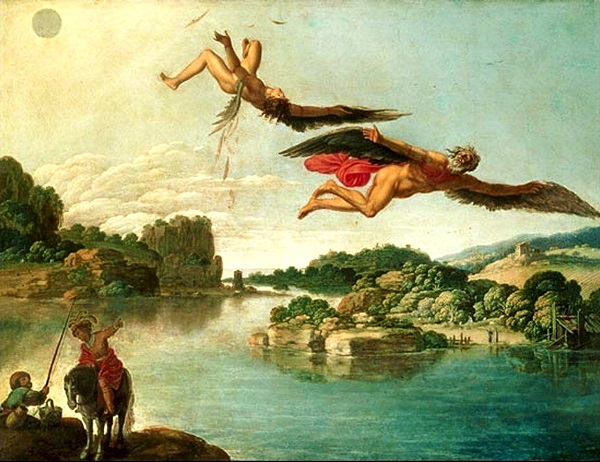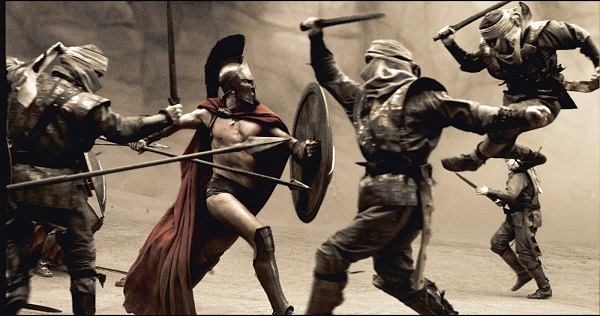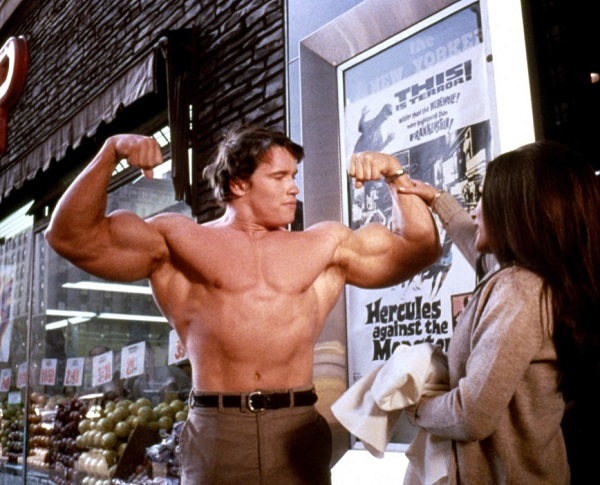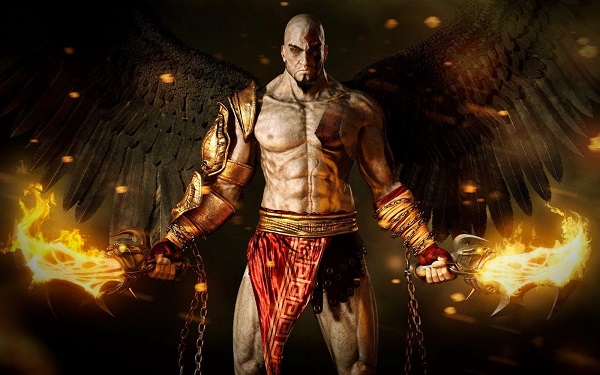The Good & Bad of Greek Mythology in Film
Ancient Greece is synonymous for being the birth place of Western Civilization, giving the world democracy, many forms of philosophy and some of the most famous stories known to man. Hercules is one of the greatest heroes in Greek mythology and he has appeared in two movies this year, so now is a great time to have a quick run through about the adaptations of Greek mythology.
Greek mythology is ever present in popular culture and most people have at least a basic knowledge of the subject. People can easily name a few Greek gods, fables like "Icarus" and "Pandora's Box" are told to us as children and Homer's
The Iliad and
Odyssey are literary classics. Throughout the centuries many artists have painted famous scenes from Greek mythology.

Like many classic tales Greek mythology has been adapted into films, television programs, novels and comics. Some movies based on Greek mythology have become cult classics:
Jason and the Argonauts and the 1981 version of
Clash of Titans. Both movies are known for Ray Harryhausen's fantastic stop motion animation as he brought to life many mythological creatures the Talos, the Pegasus, Medusa and the Kraken (which is actually from Norse mythology). Both movies are fun romps as Gods battle, play games against each other, and use men as their toys.
Jason and the Argonauts has a particularly fun sequence at the end as our heroes battle an army of skeletons.
The Iliad received a loose adaptation in 2004 in the form of the big budget movie
Troy.
Troy was a movie aiming to capitalize on the success of
The Lord of the Rings trilogy by being a big epic of a movie with big battles and had an all star cast featuring Brad Pitt, Eric Bana and Orlando Bloom. But
Troy cut the role of the Greek Gods by being a more grounded affair. It was also a very expensive movie, having a budget of $175 Million and only earned $133 Million the USA: but it did make $497 Million worldwide.

The film
300 was a big hit, making $456 Million from a $65 Million investment. Even though it was based on a graphic novel that was based on real events,
300 was a highly stylized action movie with fantasy elements. There have been attempts to copy the success of
300, either trying to replicate the visual look, the violence or focus on Greek mythology.

Since the success of
300 Warner Brothers and Legendary Pictures restarted
The Clash of the Titans series,
remaking the 1981 movie and then followed up with a superior sequel
Wrath of the Titans. The producers of
300 tried to repeat their success with
Immortals, a stylized action film as a mortal man Theseus (Henry Cavil) has to stop a power crazed king from freeing the Titans and overthrowing the Gods.
Immortals was fantastic looking but disappointing on a story level: it was frustrating because it could have been great. The Renny Harlin movie,
The Legend of Hercules, was highly criticized partly because it tried to copy
300 slo-mo action sequences.
There have also been attempts to modernize Greek mythology and bring it to a more contemporary setting. The
Percy Jackson series attempted to follow the series of
Harry Potter, following a similar story line and brought the Greek Gods and other famous characters from Greek mythology to present day America. The Coen Brothers even modernized Homer's
The Odyssey with their critically acclaimed comedy
Oh Brother Where Art Thou?, translating the tale to the music scene of Mississippi in the 1930s.
The Odyssey also received a quick animated adaptation in
The Simpsons episode "Tales from the Public Domain".

Hercules himself has appeared in a number of movies, in roles that are both big and small, and in movies ranging in quality. He had a small role in
Jason and the Argonauts and Disney had great success with their 1998 animated movie making a colorful adventure. Arnold Schwarzenegger's first acting role was in
Hercules in New York: it is also considered one of his worst movies.
As well as big fantasy movies and adaptations, Greek mythology has had more subtle references in cinema and other media. J.K. Rowling and C.S. Lewis used elements from Greek mythology like Centaurs in the books and subsequent film adaptations. Spaceships in
Prometheus and
Sunshine were named after tragic Greek figures: you would have thought people naming spaceships would have more of an irony sensor.
Greek Mythology has also appeared in and influenced other media. Wonder Woman's home was based on the Amazon's of Greek legend and Dwayne Johnson's new movie is based on a graphic novel by Steven Moore.
Hercules: The Legendary Journeys and
Xena: Warrior Princess were popular TV series in the 90s and gamers got an ultra-violent fix with the
God of War games as Kratos tries to kill the Olympus Gods.
Greek Mythology has been and will continue to be a rich source of material for all facets of culture. There have been lulls with cinematic adaptations, but many Greek legends are known classics, consequently there will be adaptations in some form!
 Like many classic tales Greek mythology has been adapted into films, television programs, novels and comics. Some movies based on Greek mythology have become cult classics: Jason and the Argonauts and the 1981 version of Clash of Titans. Both movies are known for Ray Harryhausen's fantastic stop motion animation as he brought to life many mythological creatures the Talos, the Pegasus, Medusa and the Kraken (which is actually from Norse mythology). Both movies are fun romps as Gods battle, play games against each other, and use men as their toys. Jason and the Argonauts has a particularly fun sequence at the end as our heroes battle an army of skeletons.
The Iliad received a loose adaptation in 2004 in the form of the big budget movie Troy. Troy was a movie aiming to capitalize on the success of The Lord of the Rings trilogy by being a big epic of a movie with big battles and had an all star cast featuring Brad Pitt, Eric Bana and Orlando Bloom. But Troy cut the role of the Greek Gods by being a more grounded affair. It was also a very expensive movie, having a budget of $175 Million and only earned $133 Million the USA: but it did make $497 Million worldwide.
Like many classic tales Greek mythology has been adapted into films, television programs, novels and comics. Some movies based on Greek mythology have become cult classics: Jason and the Argonauts and the 1981 version of Clash of Titans. Both movies are known for Ray Harryhausen's fantastic stop motion animation as he brought to life many mythological creatures the Talos, the Pegasus, Medusa and the Kraken (which is actually from Norse mythology). Both movies are fun romps as Gods battle, play games against each other, and use men as their toys. Jason and the Argonauts has a particularly fun sequence at the end as our heroes battle an army of skeletons.
The Iliad received a loose adaptation in 2004 in the form of the big budget movie Troy. Troy was a movie aiming to capitalize on the success of The Lord of the Rings trilogy by being a big epic of a movie with big battles and had an all star cast featuring Brad Pitt, Eric Bana and Orlando Bloom. But Troy cut the role of the Greek Gods by being a more grounded affair. It was also a very expensive movie, having a budget of $175 Million and only earned $133 Million the USA: but it did make $497 Million worldwide.
 The film 300 was a big hit, making $456 Million from a $65 Million investment. Even though it was based on a graphic novel that was based on real events, 300 was a highly stylized action movie with fantasy elements. There have been attempts to copy the success of 300, either trying to replicate the visual look, the violence or focus on Greek mythology.
The film 300 was a big hit, making $456 Million from a $65 Million investment. Even though it was based on a graphic novel that was based on real events, 300 was a highly stylized action movie with fantasy elements. There have been attempts to copy the success of 300, either trying to replicate the visual look, the violence or focus on Greek mythology.
 Since the success of 300 Warner Brothers and Legendary Pictures restarted The Clash of the Titans series, remaking the 1981 movie and then followed up with a superior sequel Wrath of the Titans. The producers of 300 tried to repeat their success with Immortals, a stylized action film as a mortal man Theseus (Henry Cavil) has to stop a power crazed king from freeing the Titans and overthrowing the Gods. Immortals was fantastic looking but disappointing on a story level: it was frustrating because it could have been great. The Renny Harlin movie, The Legend of Hercules, was highly criticized partly because it tried to copy 300 slo-mo action sequences.
There have also been attempts to modernize Greek mythology and bring it to a more contemporary setting. The Percy Jackson series attempted to follow the series of Harry Potter, following a similar story line and brought the Greek Gods and other famous characters from Greek mythology to present day America. The Coen Brothers even modernized Homer's The Odyssey with their critically acclaimed comedy Oh Brother Where Art Thou?, translating the tale to the music scene of Mississippi in the 1930s. The Odyssey also received a quick animated adaptation in The Simpsons episode "Tales from the Public Domain".
Since the success of 300 Warner Brothers and Legendary Pictures restarted The Clash of the Titans series, remaking the 1981 movie and then followed up with a superior sequel Wrath of the Titans. The producers of 300 tried to repeat their success with Immortals, a stylized action film as a mortal man Theseus (Henry Cavil) has to stop a power crazed king from freeing the Titans and overthrowing the Gods. Immortals was fantastic looking but disappointing on a story level: it was frustrating because it could have been great. The Renny Harlin movie, The Legend of Hercules, was highly criticized partly because it tried to copy 300 slo-mo action sequences.
There have also been attempts to modernize Greek mythology and bring it to a more contemporary setting. The Percy Jackson series attempted to follow the series of Harry Potter, following a similar story line and brought the Greek Gods and other famous characters from Greek mythology to present day America. The Coen Brothers even modernized Homer's The Odyssey with their critically acclaimed comedy Oh Brother Where Art Thou?, translating the tale to the music scene of Mississippi in the 1930s. The Odyssey also received a quick animated adaptation in The Simpsons episode "Tales from the Public Domain".
 Hercules himself has appeared in a number of movies, in roles that are both big and small, and in movies ranging in quality. He had a small role in Jason and the Argonauts and Disney had great success with their 1998 animated movie making a colorful adventure. Arnold Schwarzenegger's first acting role was in Hercules in New York: it is also considered one of his worst movies.
As well as big fantasy movies and adaptations, Greek mythology has had more subtle references in cinema and other media. J.K. Rowling and C.S. Lewis used elements from Greek mythology like Centaurs in the books and subsequent film adaptations. Spaceships in Prometheus and Sunshine were named after tragic Greek figures: you would have thought people naming spaceships would have more of an irony sensor.
Greek Mythology has also appeared in and influenced other media. Wonder Woman's home was based on the Amazon's of Greek legend and Dwayne Johnson's new movie is based on a graphic novel by Steven Moore. Hercules: The Legendary Journeys and Xena: Warrior Princess were popular TV series in the 90s and gamers got an ultra-violent fix with the God of War games as Kratos tries to kill the Olympus Gods.
Greek Mythology has been and will continue to be a rich source of material for all facets of culture. There have been lulls with cinematic adaptations, but many Greek legends are known classics, consequently there will be adaptations in some form!
Hercules himself has appeared in a number of movies, in roles that are both big and small, and in movies ranging in quality. He had a small role in Jason and the Argonauts and Disney had great success with their 1998 animated movie making a colorful adventure. Arnold Schwarzenegger's first acting role was in Hercules in New York: it is also considered one of his worst movies.
As well as big fantasy movies and adaptations, Greek mythology has had more subtle references in cinema and other media. J.K. Rowling and C.S. Lewis used elements from Greek mythology like Centaurs in the books and subsequent film adaptations. Spaceships in Prometheus and Sunshine were named after tragic Greek figures: you would have thought people naming spaceships would have more of an irony sensor.
Greek Mythology has also appeared in and influenced other media. Wonder Woman's home was based on the Amazon's of Greek legend and Dwayne Johnson's new movie is based on a graphic novel by Steven Moore. Hercules: The Legendary Journeys and Xena: Warrior Princess were popular TV series in the 90s and gamers got an ultra-violent fix with the God of War games as Kratos tries to kill the Olympus Gods.
Greek Mythology has been and will continue to be a rich source of material for all facets of culture. There have been lulls with cinematic adaptations, but many Greek legends are known classics, consequently there will be adaptations in some form!